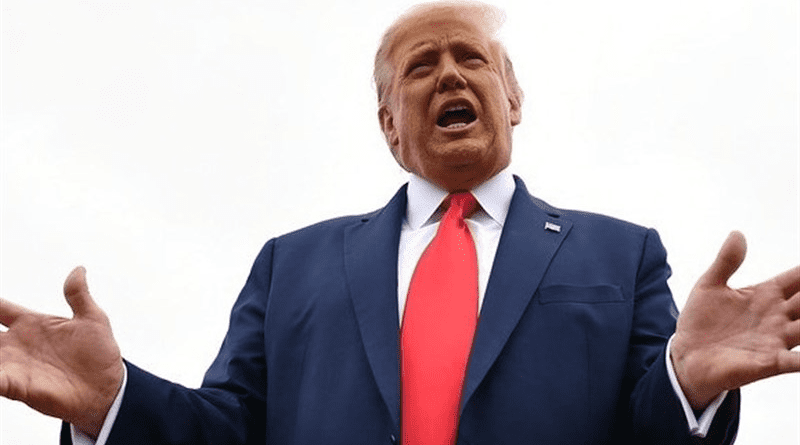Trump Pleads Not Guilty To Federal Charges
By VOA
By Masood Farivar
Former President Donald Trump appeared before a federal magistrate in Miami on Tuesday to plead not guilty to charges that he illegally retained hundreds of classified government security documents after he left the White House and obstructed government efforts to retrieve them.
Trump made history last week when a federal grand jury indicted him on 37 criminal counts, including 31 counts of “willfully retaining” classified national defense information at Mar-a-Lago, his Florida residence and private club.
The former president’s arraignment was held under heavy security, as hundreds of Trump fans gathered outside.
Trump had called on his supporters to rally in Miami, raising concerns that the gathering might escalate into violence. But the court proceedings were without incident.
The former president’s motorcade entered the courthouse area shortly before 2 p.m., as supporters standing behind police lines shouted, “We Love Trump.”
He was then processed before appearing before Magistrate Judge Jonathan Goodman to plead not guilty to all 37 counts.
“We most certainly entered a plea of not guilty,” Trump attorney Todd Blanche told the judge.
The charges are viewed by some experts as the greatest legal peril facing the former president.
In the 49-page indictment, Trump is accused of taking hundreds of classified documents from the White House to Mar-a-Lago before he left office in January 2021, following his electoral defeat to President Joe Biden.
The documents were among the government’s most closely guarded secrets. They contained information about U.S. nuclear programs, the potential vulnerability of the U.S. and its allies to an attack and plans for a possible response, according to the indictment. Their disclosure, the indictment says, could endanger U.S. national security.
Each of the 31 counts of “willful retention” of classified national defense information represents a different document that he took from the White House and carries a maximum penalty of 10 years in prison. Willful retention is deliberately keeping and refusing to turn over documents.
The other six charges against Trump are centered on his alleged efforts to conceal his retention of the documents after the FBI and a grand jury demanded their return.
According to the indictment, the former president allegedly instructed one of his lawyers to declare that he did not have the documents sought by the grand jury. And when the lawyer suggested a search of Mar-a-Lago, Trump allegedly had the documents moved from a storage room to his residence to avoid detection.
Trump, the leading Republican presidential candidate, has reacted defiantly to the indictment, calling it a “vicious persecution” by “the Biden administration’s weaponized department of injustice” and vowing to continue campaigning even if he is convicted.
“I’ll never leave,” Trump told Politico in an interview Saturday.
He was expected to fly to New Jersey after his arraignment to deliver remarks in his defense and host the first fundraiser of his 2024 presidential campaign.
The case has been assigned to Judge Aileen Cannon, a Trump appointee who drew fire for favoring the former president in her rulings in the case last year.
Cannon briefly blocked federal investigators from examining the documents seized from Mar-a-Lago last August and appointed a special master to review them. But an appeals court later overturned her ruling, saying she did not have the authority to rule as she did.

